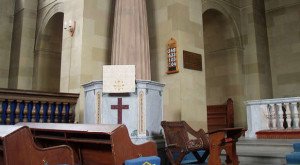The Loss of the Prophetic Pulpit
Between Two Worlds Day 33 (of 40)After many weeks of thought, yesterday I finally stepped into the moral and political fray that is now our run-up to the election of a new president. I hesitated especially because when I speak I never only speak for myself. As an ordained minister my views will also always be seen as representing the Church to some extent or another. As readers pondered and opined about our current state of political theater/reality TV one reader asked, "One has to wonder, what does the Church have to do with all of this?" Yesterday when I wrote I wasn't sure exactly why in my blog themed "Between Two Worlds" I felt compelled to reflect and write on the phenomenon we now know as Trump. Today as I pondered Sylvia's question I was reminded almost immediately that it has been the slow erosion of the power of the pulpit that propelled me to my first pilgrimage and subsequent blogging.It would be a gross generalization to say that this is true for all churches. However, one of the clear trends that I have experienced is that as churches have declined and become concerned about survival they have abandoned their commitment to the prophetic voice of the pulpit. A pastor dare not offend 10-15% of pledging members in a church where just surviving year to year is the top priority.In many ways my blog is my attempt to have the freedom to restore the power of the pulpit where I can speak freely, truthfully, and as prophetically as the times call for. I believe this is one of those times.Below is an excerpt from my book ALONE: A 4,000 Mile Search for Belonging where I first acknowledged the shift in the power of the pulpit (you can order that book at http://www.pedalpilgrim.com/book). I was raised in a time when the Church was the moral pulpit and voice for the community. To be a pastor meant to speak to the broader society and act as America’s conscience. That had changed. Now to be a pastor means to speak only to the religious faithful. My obligation was no longer to the theological integrity and voice of ministry; my obligation was now to those who paid my salary, whose greatest concern was how to save the Church, pay the bills, and meet the pastoral needs of those sitting in the pews. I had finally remembered. I got into this preaching business because I was moved by the faith and commitment of religious leaders who used their theological ideas to serve humanity. Somehow, over the years, the pulpit had turned into a voice-box for the religiously faithful—and somehow I’d got caught in that shift. I believed in the power of the pulpit, but now the pulpit was owned by those more concerned about the survival of the Church than being the conscience of the community. Page 297
Yesterday when I wrote I wasn't sure exactly why in my blog themed "Between Two Worlds" I felt compelled to reflect and write on the phenomenon we now know as Trump. Today as I pondered Sylvia's question I was reminded almost immediately that it has been the slow erosion of the power of the pulpit that propelled me to my first pilgrimage and subsequent blogging.It would be a gross generalization to say that this is true for all churches. However, one of the clear trends that I have experienced is that as churches have declined and become concerned about survival they have abandoned their commitment to the prophetic voice of the pulpit. A pastor dare not offend 10-15% of pledging members in a church where just surviving year to year is the top priority.In many ways my blog is my attempt to have the freedom to restore the power of the pulpit where I can speak freely, truthfully, and as prophetically as the times call for. I believe this is one of those times.Below is an excerpt from my book ALONE: A 4,000 Mile Search for Belonging where I first acknowledged the shift in the power of the pulpit (you can order that book at http://www.pedalpilgrim.com/book). I was raised in a time when the Church was the moral pulpit and voice for the community. To be a pastor meant to speak to the broader society and act as America’s conscience. That had changed. Now to be a pastor means to speak only to the religious faithful. My obligation was no longer to the theological integrity and voice of ministry; my obligation was now to those who paid my salary, whose greatest concern was how to save the Church, pay the bills, and meet the pastoral needs of those sitting in the pews. I had finally remembered. I got into this preaching business because I was moved by the faith and commitment of religious leaders who used their theological ideas to serve humanity. Somehow, over the years, the pulpit had turned into a voice-box for the religiously faithful—and somehow I’d got caught in that shift. I believed in the power of the pulpit, but now the pulpit was owned by those more concerned about the survival of the Church than being the conscience of the community. Page 297
